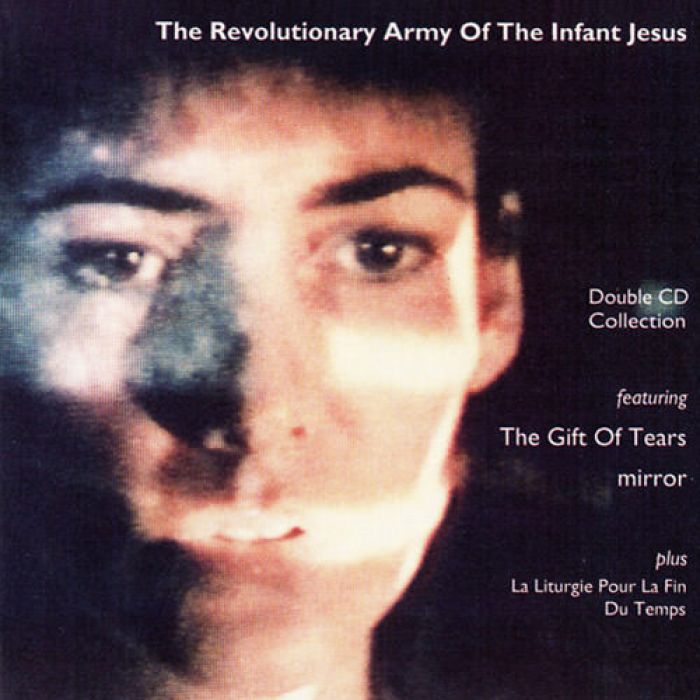The Gift of Tears/Mirror/La Liturgie Pour La Fin Du Temps by Revolutionary Army Of The Infant Jesus (Review)

The problem with double discs is that you either win big or you lose big. Plunking down for two hours is a pretty hefty investment, especially if that disc is an import like the one in this review. However, I can honestly say that The Gift Of Tears/Mirror is a definite winner and an album that I am proud to have in my collection.
That’s not to say that this disc doesn’t have its flaws. However, the sheer nature of this disc far outshines any of the few gripes I have. None of the songs are bad, per se. They’re all of high calibre; it’s just that some of them seem to grate on me, especially those that feature squawking saxophones — and even those are good. Sounds paradoxical, huh?
First off, this album is impossible to define. Trust me, I’ve tried on numerous occasions. The Revolutionary Army Of The Infant Jesus goes all over the map with this album, but most of the music could be considered folky; not in the Woody Guthrie vein. Think more along the lines of gothic/apocalyptic folk a la Current 93 or Death In June, and even Dead Can Dance (though not as ethnic). However, just when you think you’ve pinned it down, they start doing ambient industrial or gothic or orchestral or medieval or… See what I mean? And what’s even more amazing is that these musicians are very good at whatever they try.
I won’t bore you with too many details, but I’d like to hit on a couple of my favorite tracks. “Tales From Europe” features a beautifully simple, medieval-sounding flute melody that plays throughout the whole song, along with samples (yes, samples) from what I’m guessing to be Russian speeches. The whole song moves along beautifully, and I can almost picture travelers journeying through medieval Europe.
“De Profundis” is a very spooky ambient-industrial song, with distant clanks and groans. This song freaked me when I first heard it; now I really like it. “The Singing Ringing Tree” features a very playful, yet sombre (another paradox, I know) keyboard melody and some of the gorgeous female vocals. “Communion” is a gorgeous ambient piece that sounds like they’re using samples of angels’ voices, it’s that beautiful. Unfortunately, it’s fairly short. Still, it’s a perfect way to close out disc one.
Disc two (Mirror) is my favorite of the two discs. The songs on here just seem, well, more solid and wondrous than those on the first disc. Most bands would probably sell their souls to make a disc as good as The Gift Of Tears. The Revolutionary Army Of The Infant Jesus just pass these bands by with another masterpiece.
“Inmaculado” has some very gorgeous female vocals (who is that vocalist?) with acoustic guitar. The song almost has a ballad-feel, but is much more orchestral than that. “Joy Of The Cross” is yet another track that only “gorgeous” can describe. This time, male and female vocals are combined with a delicate classical guitar. The voices perfectly complement each other and the guitar. The song seems to rise and fall with grace and beauty and I could perfectly imagine this song being sung in a cathedral for mass.
“Nostalgia” is my favorite track on either disc; it’s almost foreboding in it’s beauty. This song is divided into several movements, all within the space of under 7 minutes. The first is a very sombre and beautiful keyboard piece. Slowly, more Russian samples gently lift through the mix, growing in passion as they do in volume. These again fade away and suddenly, I’m hearing samples from Jean Cocteau’s brilliant film Orphée (these are used several times in the album). All the while, gentle synths are gliding underneath the samples. Slowly, the Russian samples reassert themselves, but slowly so as not to startle the listener. These again give way to more samples, this time of a beautiful choir, singing a lovely lullaby. On this very reverent tone, the song ends and leaves me begging for more on one hand and on the other, thankful for stopping for fear that any more beauty would become cliche.
Is this disc worth the money I paid? Yes, perhaps more so that almost any other disc I’ve mail-ordered. It’s a foreboding album to listen to, and almost draining, but it’s one that will always hold a special spot in my CD collection. The only real complaints I have are that are no liner notes and just a picture of the band, some of the songs could have been toned down in the saxophone department, and that there isn’t more music like this, Christian or secular.
The last one is by far the greatest; to deny the populace art like this is truly a crime. It’s not for those seeking an immediate thrill, but for the patient few, they shall be rewarded.